OFI Care Centre and Quarantine
The OFI Care Centre and Quarantine facility was established in 1998 (Orangutan Care Centre). Located in the village of Pasir Panjang, near Tanjung Puting National Park, the Orangutan Care Centre was created for confiscated ex-captive orangutans needing medical and other care as well as forest experience in preparation for their release into the wild. The Orangutan Care Centre also enables Indonesian wildlife officers, police, OFI staff and concerned individuals to bring confiscated, sick, and injured orangutans (including wild orangutans) to a facility in Central Kalimantan capable of providing a very high standard of veterinary care.
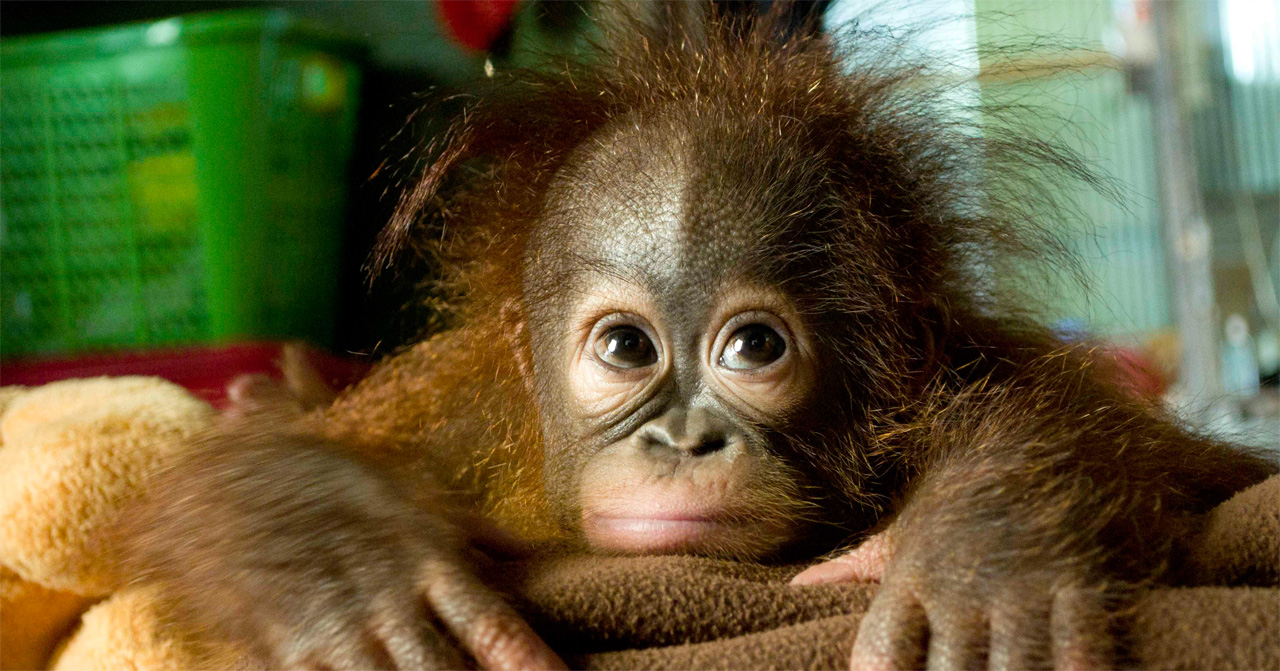
The Orangutan Care Centre also enables Indonesian wildlife officers, police, OFI staff and concerned individuals to bring confiscated, sick, and injured orangutans (including wild orangutans) to a facility in Central Kalimantan capable of providing a very high standard of veterinary care.
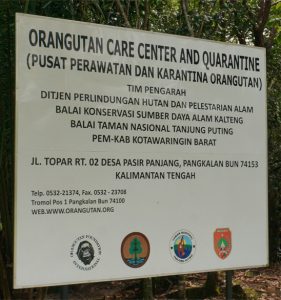 Orangutans, once rescued, need medical, parental, and emotional care before they can be successfully released into the wild. All newly arrived orangutans initially undergo a 30 day quarantine during which the Orangutan Care Centre veterinarians give the rescued orangutans an extensive health check. Blood, faeces, and urine are examined. Afterwards orangutans are tested for evidence of tuberculosis and hepatitis. Most rescued orangutans have intestinal parasites as a result of their captivity. Some parasites might have been carried over from the wild. Nonetheless, intestinal parasites must be eradicated to increase the odds of their survival in the wild. Occasionally, rescued orangutans also have a form of orangutan malaria that must also be treated. Once released from quarantine, the rescued orangutans stay in age-appropriate groups at the various facilities at the Orangutan Care Centre. They are de-wormed every three months while the local OFI staff also receive de-worming medicine every six months. (De-worming medicines are alternated to prevent resistance developing).
Orangutans, once rescued, need medical, parental, and emotional care before they can be successfully released into the wild. All newly arrived orangutans initially undergo a 30 day quarantine during which the Orangutan Care Centre veterinarians give the rescued orangutans an extensive health check. Blood, faeces, and urine are examined. Afterwards orangutans are tested for evidence of tuberculosis and hepatitis. Most rescued orangutans have intestinal parasites as a result of their captivity. Some parasites might have been carried over from the wild. Nonetheless, intestinal parasites must be eradicated to increase the odds of their survival in the wild. Occasionally, rescued orangutans also have a form of orangutan malaria that must also be treated. Once released from quarantine, the rescued orangutans stay in age-appropriate groups at the various facilities at the Orangutan Care Centre. They are de-wormed every three months while the local OFI staff also receive de-worming medicine every six months. (De-worming medicines are alternated to prevent resistance developing).
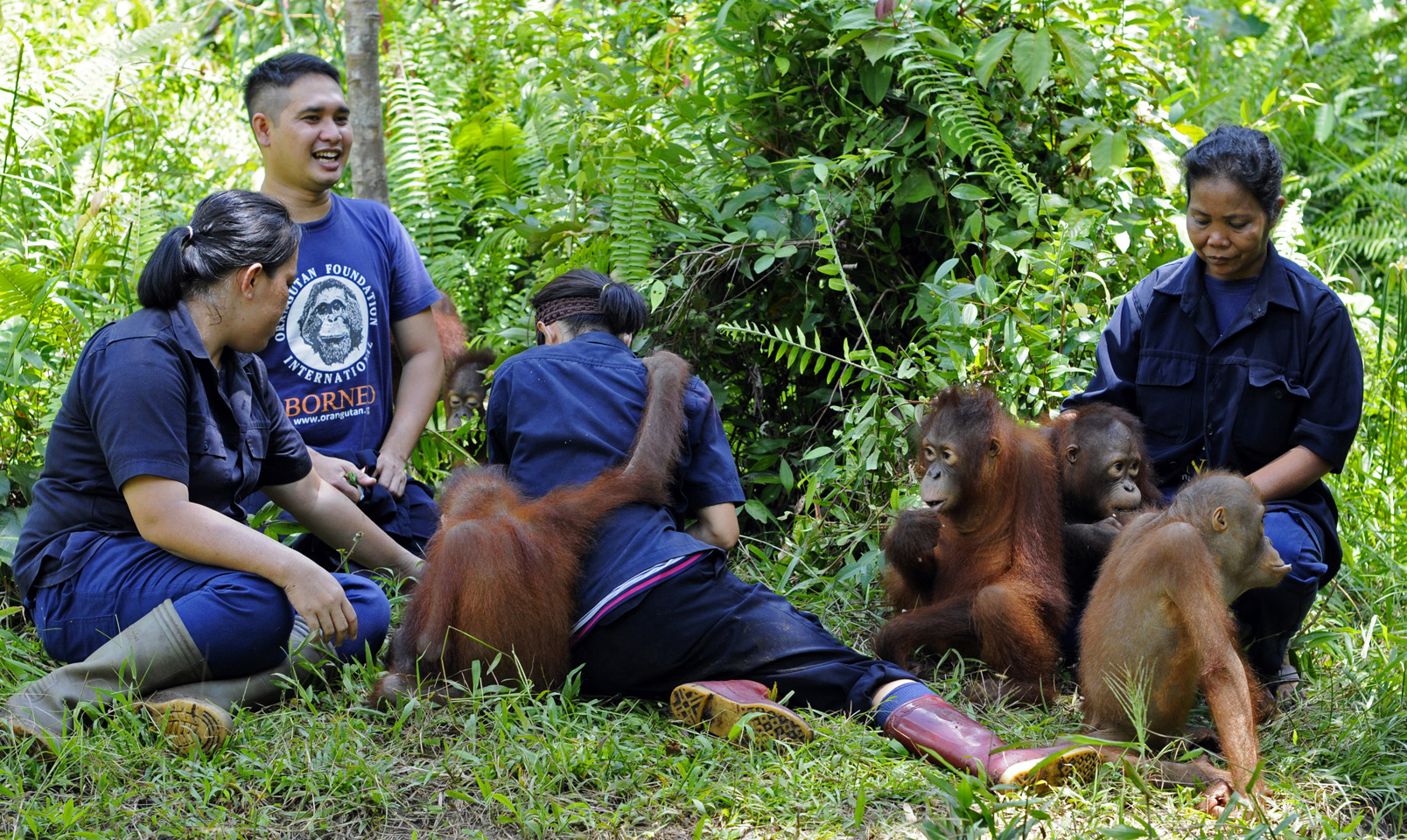
In the wild, orangutan infants share an intense bond with their mothers and do not leave them until they are, at least, 8 or 9 years of age. At the Orangutan Care Centre this intense bond is replicated, to some extent, by the relationships orangutan infants develop with their caregivers. These local caregivers are the surrogate mothers who help take care of the infants until they become large juveniles.
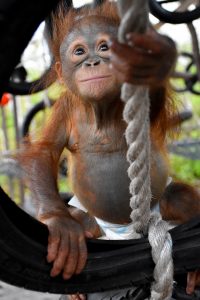 The job is made harder because many infants come to the Orangutan Care Centre physically, mentally, and/or emotionally wounded. Many suffer from injuries received when their mothers were killed. Many also suffer from malnutrition and failure to thrive. Some require long-term medical and other intense care that may last for years. As infants, all these orangutans need to be fed, housed, and cared for. They also need to learn how to make night nests in the trees, how to forage and process wild foods, and how to move competently through the canopy. They all need daily enrichment activity and enrichment materials, delivered by trained staff and occasional volunteers, to ensure satisfactory cognitive development, as well as mental and sensory well-being.
The job is made harder because many infants come to the Orangutan Care Centre physically, mentally, and/or emotionally wounded. Many suffer from injuries received when their mothers were killed. Many also suffer from malnutrition and failure to thrive. Some require long-term medical and other intense care that may last for years. As infants, all these orangutans need to be fed, housed, and cared for. They also need to learn how to make night nests in the trees, how to forage and process wild foods, and how to move competently through the canopy. They all need daily enrichment activity and enrichment materials, delivered by trained staff and occasional volunteers, to ensure satisfactory cognitive development, as well as mental and sensory well-being.
Daily outings to the forest are a critical part of the infant orangutan enrichment program. It is called “soft release” as opposed to the “hard release” that occurs when orangutans from the Orangutan Care Centre are permanently released into the wild.
For much of the day, rescued infant orangutans are free to explore, forage, and play in the enrichment forest next to the Orangutan Care Centre under the watchful eye of their caregivers, thus completing a critical part of their rehabilitation process and learning to live and survive in the wild. Given limits in current resources (staff and available size of forest), older juveniles and adolescents are not released into the Orangutan Care Centre forest on a daily basis as mating often occurs along with unwanted pregnancies. Thus, male and female releases of the larger juveniles occur on alternative days. Sick or injured orangutans have to be quarantined until they recover and are healthy again. Although some of the larger males cannot go out into the enrichment forest for obvious safety reasons related to their size and potential aggressiveness (for surrounding communities as well as OFI staff), these orangutans will eventually return to the wild when suitable, safe forest is found. Releasing orangutans into the wild in unsustainable forests is a virtual death sentence.
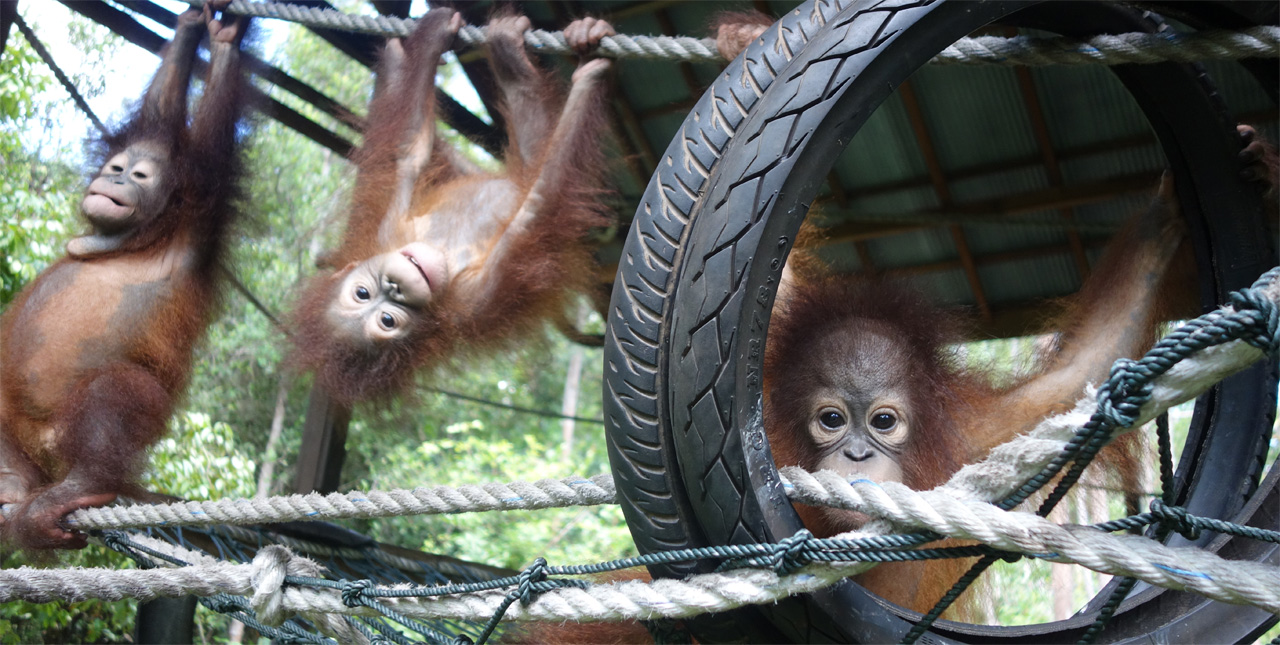
This is the main constraint on the release of wild born ex-captive rehabilitated orangutans into the wild. With the massive deforestation caused by palm oil plantation expansion, as well as other kinds of development such as industrial timber plantations for pulp and paper, there is very little forest left for all orangutans, whether wild or rehabilitated ex-captive individuals.
Medical facilities
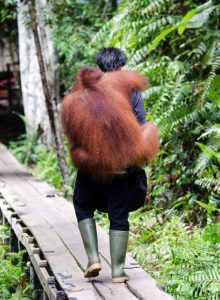 The Orangutan Care Centre is currently staffed by full-time Indonesian veterinarians with a local medical doctor on call. The Centre currently employs over 130 local staff and takes care of 330 orangutan orphans, all of whom will be eventually released into the wild. The Orangutan Care Centre’s current facilities include an operating room, X-ray department, medical laboratory, library, living quarters for veterinary staff as well as a separate quarantine complex.
The Orangutan Care Centre is currently staffed by full-time Indonesian veterinarians with a local medical doctor on call. The Centre currently employs over 130 local staff and takes care of 330 orangutan orphans, all of whom will be eventually released into the wild. The Orangutan Care Centre’s current facilities include an operating room, X-ray department, medical laboratory, library, living quarters for veterinary staff as well as a separate quarantine complex.
The Orangutan Care Centre is located within 80 hectares of relict primary peatswamp forest where orangutan orphans are released daily. This forest provides a type of “halfway house” where orphans can learn locomotory and nest-building skills as well as foraging techniques. Within the forest are small wooden facilities that allow some of the orangutans and their caregivers to sleep in the forest at night.
Support the Orangutan Care Centre by becoming a foster parent
Your donation will go to supporting enrichment and providing extra nutrition for the orangutans in our care, upgrading the Orangutan Care Center facilities, enlarging sleeping cages and building new playground facilities as well as an enclosed orangutan “island” in the rainforest where ex-captive orangutans can learn to be wild again.
